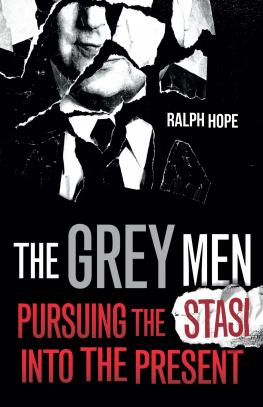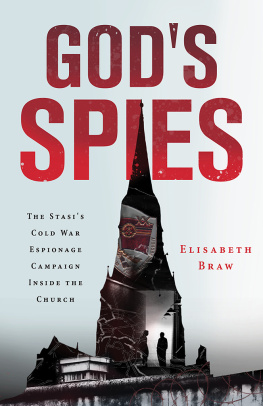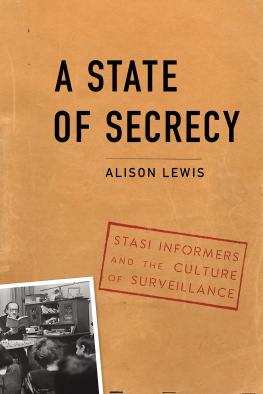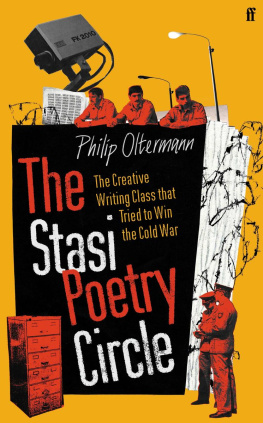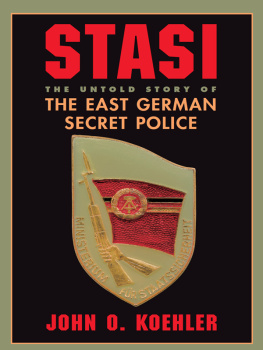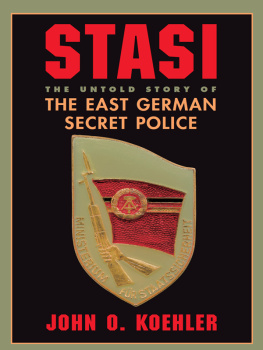This isnt a history book, as Im not a historian. But like all true stories, it begins with and is carried forward by the past. More than that, its a product of real events and circumstances that are still hard to believe, the lingering effects of which confronted me daily during my years serving as an FBI agent in Eastern Europe and other places around the world that were traumatized by tyranny. These real dramas deserve far more than a printed page, and are deeply personal to people whose lives were forever altered. They were confirmed by my many formal and informal conversations with police and intelligence services of those countries and my own.
Where the story will end remains to be seen.
Preface
Dresden, East Germany
Tuesday
What would happen today, Siegfried would never be allowed to forget.
He stood on a street corner with a group of more than a hundred young activists who were giddy with excitement. It was December 5, 1989, and tyrannys half-century grip on Eastern Europe was breaking apart in front of them. The Berlin Wall had fallen less than a month before and anything now seemed possible. Communism was reeling and a new world seemed nearly within reach. After demonstrating in the streets for weeks, frequently clashing violently with security forces, they all now sensed that something had changed. Word quickly circulated that the inner sanctum, the offices of the East German secret police, the feared Stasi, were being occupied all over the country.
Why not then also here in Dresden?
The group fragmented and rushed down Bautzner Strasse and along the Elbe River, before finally crowding together again near a grey compound that they all knew housed the regional Stasi offices. For forty years before that day, and even a month or a week before now, this place would have been avoided at all costs. The block buildings complete with prison cells symbolized the iron grip that the Ministry for State Security had wielded over the city for decades, and that the Soviets had before that. It was a place of nothing other than misery and fear. Never somewhere any of them would have gone voluntarily. Until today.
The crowd grew much larger and the winter night had already come by 5pm when they made their move. Gathering courage and sweating in spite of the wind from the river blowing damp and cold, several hundred activists pushed their way inside the iron front gate, determined to prevent the destruction of whatever files were there. They hoped not to get shot in the process.
To their surprise, no machine-gun-carrying Stasi guards in grey uniforms stood in their way. The few occupants inside appeared confused and accommodating, and the place was largely empty. They opened office doors, and looked in drawers. They were there to protect the files, they announced. Nobody stopped them. The fear of a dictatorship had lost its grasp, and everyone there could smell death.
Now more emboldened, and quite sure something monumental had taken place, Siegfried and part of the crowd clustered at the entrance and quickly descended the stairs. On a whim they rushed together across the wide boulevard, chattering nervously, their eyes now focused on a pale yellow house within sight on Angelikastrasse. Everyone in Dresden knew the KGB was headquartered there. This time without any hesitation they confronted a lone guard at the gate and repeated their demand to be let in. The crowd seethed with energy and stared impatiently as the guard rushed inside the building, returning with a young, small officer dressed in the green uniform of a Soviet lieutenant colonel. This Russian officer appeared agitated as he approached the gate, speaking fluent German.
My comrades are armed, and authorized to use our weapons in an emergency.
The group withdrew. The face of that Soviet officer remained burned in Siegfrieds mind, and also the name when he later learned it. It was Vladimir Vladimirovich Putin, the future Russian president. Putin was then assigned to Dresden on his first foreign KGB posting. On that day a Stasi-issued identification card was in his pocket.
Throughout the chaos on the streets that week, Putin and the three other KGB officers sitting on the second floor of the house on Angelikastrasse that evening naturally assumed theyd receive ample protection from a nearby Soviet tank regiment that was based in the city. The tank commander was close and indeed fully prepared to intervene with brute force. He only waited for the call from Moscow, which they were all sure would soon come. It never did. Moscow was silent, they were all told. Many of those in the know believe this incident, and the resulting rapid fall of the secret police and communist East Germany, had a profound impact on Putin. He was soon forced to hastily drive back to his hometown of Leningrad, which had suddenly become St Petersburg again, in disbelief, with little besides his wife and a twenty-year-old washing machine that hed received as a gift. It was over. On arriving in St Petersburg his colleagues at the KGB even started referring to him by a new nickname:
Stasi .
This was the end for a young Vladimir Putin, and for the ruthless Stasi. Everything was finished.
Or was it?
PART I
1
Personal Destruction as a Fine Art
It was a crisp fall morning in 2008 and dawn had barely arrived. The sort of day that warned of yet another early and brutally cold Baltic winter. I was driving a vehicle with diplomatic plates on a deserted road, speeding to a location very near the Russian border.
As the deputy FBI agent responsible for liaison in the region with criminal or terrorist investigations involving all of the fifty-six domestic Bureau field offices, I was in yet another unusual job. Next to me that morning riding shotgun was an ethnic Russian police officer from that Baltic state. I knew Anatoly well, having worked with him on cases involving organized crime and cybercriminals that touched his country and the United States. As is usually true, many found it irresistible and not so difficult to steal from America. Computers made it dramatically easier to do so from the safety of St Petersburg or a Moscow suburb. But sometimes they crossed a border, and sometimes they waited a little too long to cross back.
As a rule, while working overseas I always carefully avoided mentioning politics or history with any of my contacts. That was especially true in formerly occupied countries. There was tragedy of many kinds everywhere in Eastern Europe, and it was frequently unclear which type someone had borne. The people here were warm and genuine, but also hesitant and somewhat formal. It was still odd enough to come across an American, besides the occasional adventure-seeking tourist. However, law enforcement people worldwide share two things: one is wanting to get the bad guy, and the other is talking when bored.

